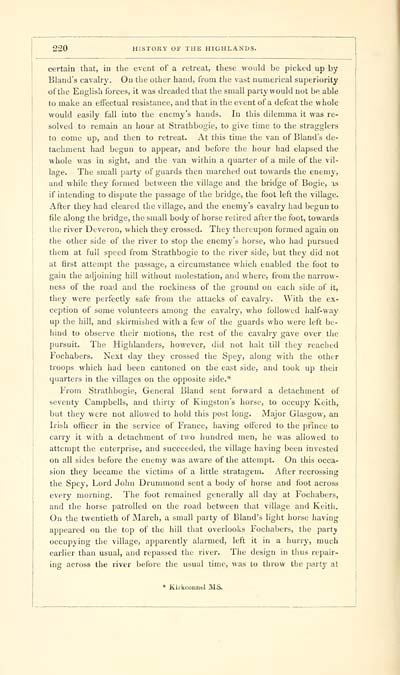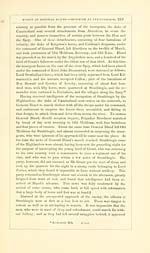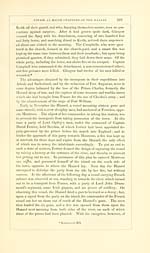Download files
Complete book:
Individual page:
Thumbnail gallery: Grid view | List view

220 HISTORY OF THE HIGHLANDS.
certain that, in the event of a retreat, these would be picked up by
Bland's cavalry. On the other hand, from the vast numerical superiority
of the English forces, it was dreaded that the small party would not be able
to make an elTectual resistance, and that in the event of a defeat the whole
would easily fall into the enemy's hands. In this dilemma it was re-
solved to remain an hour at Strathbogie, to give time to the stragglers
to come up, and then to retreat. At this time the van of Bland's de-
tachment had begun to appear, and before the hour had elapsed the
whole was in sight, and the van within a quarter of a mile of the vil-
lage. The small party of guards then marched out towards the enemy,
and while they formed between the village and the bridge of Bogie, is
if intending to dispute the passage of the bridge, the foot left the village.
After they had cleared the village, and the enemy's cavalry had begun to
file along the bridge, the small body of horse retired after the foot, towards
the river Deveron, which they crossed. They thereupon formed again on
the other side of the river to stop the enemy's horse, who had pursued
them at full speed from Strathbogie to the river side, but they did not
at first attempt the passage, a circumstance which enabled the foot to
gain the adjoining hill without molestation, and where, from the narrow-
ness of the road and the rockiness of the ground on each side of it,
they were perfectly safe from the attacks of cavalry. With the ex-
ception of some volunteers among the cavalry, who Ibllowed half-way
up the hill, and skirmished with a few of the guards who were left be-
hind to observe their motions, the rest of the cavalry gave over the
pursuit. The Highlanders, however, did not halt till they reached
Fochabers. Next day they crossed the Spey, along with the other
troops which had been cantoned on the east side, and took up theii
quarters in the villages on the opposite side.*
From Strathbogie, General Bland sent forward a detachment of
seventy Campbells, and thirty of Kingston's horse, to occupy Keith,
but they were not allowed to hold this post long. Major Glasgow, an
Irish officer in the service of France, having offered to the prince to
carry it with a detachment of two hundred men, he was allowed to
attempt the enterprise, and succeeded, the village having been invested
on all sides before the enemy was aware of the attempt. On this occa-
sion they became the victims of a little stratagem. After recrossing
the Spey, Lord John Drunimond sent a body of horse and foot across
every morning. The foot remained generally all day at Fochabers,
and the horse patrolled on the road between that village and Keith.
On the twentieth of March, a small party of Bland's light horse having
appeared on the top of the hill that overlooks Fochabers, the party
occupying the village, apparently alarmed, left it in a hurry, much
earlier than usual, and repassed the river. The design in thus repair-
ing across the river before the usual time, was to throw the f)arty at
• KirkcoiincI MS.
certain that, in the event of a retreat, these would be picked up by
Bland's cavalry. On the other hand, from the vast numerical superiority
of the English forces, it was dreaded that the small party would not be able
to make an elTectual resistance, and that in the event of a defeat the whole
would easily fall into the enemy's hands. In this dilemma it was re-
solved to remain an hour at Strathbogie, to give time to the stragglers
to come up, and then to retreat. At this time the van of Bland's de-
tachment had begun to appear, and before the hour had elapsed the
whole was in sight, and the van within a quarter of a mile of the vil-
lage. The small party of guards then marched out towards the enemy,
and while they formed between the village and the bridge of Bogie, is
if intending to dispute the passage of the bridge, the foot left the village.
After they had cleared the village, and the enemy's cavalry had begun to
file along the bridge, the small body of horse retired after the foot, towards
the river Deveron, which they crossed. They thereupon formed again on
the other side of the river to stop the enemy's horse, who had pursued
them at full speed from Strathbogie to the river side, but they did not
at first attempt the passage, a circumstance which enabled the foot to
gain the adjoining hill without molestation, and where, from the narrow-
ness of the road and the rockiness of the ground on each side of it,
they were perfectly safe from the attacks of cavalry. With the ex-
ception of some volunteers among the cavalry, who Ibllowed half-way
up the hill, and skirmished with a few of the guards who were left be-
hind to observe their motions, the rest of the cavalry gave over the
pursuit. The Highlanders, however, did not halt till they reached
Fochabers. Next day they crossed the Spey, along with the other
troops which had been cantoned on the east side, and took up theii
quarters in the villages on the opposite side.*
From Strathbogie, General Bland sent forward a detachment of
seventy Campbells, and thirty of Kingston's horse, to occupy Keith,
but they were not allowed to hold this post long. Major Glasgow, an
Irish officer in the service of France, having offered to the prince to
carry it with a detachment of two hundred men, he was allowed to
attempt the enterprise, and succeeded, the village having been invested
on all sides before the enemy was aware of the attempt. On this occa-
sion they became the victims of a little stratagem. After recrossing
the Spey, Lord John Drunimond sent a body of horse and foot across
every morning. The foot remained generally all day at Fochabers,
and the horse patrolled on the road between that village and Keith.
On the twentieth of March, a small party of Bland's light horse having
appeared on the top of the hill that overlooks Fochabers, the party
occupying the village, apparently alarmed, left it in a hurry, much
earlier than usual, and repassed the river. The design in thus repair-
ing across the river before the usual time, was to throw the f)arty at
• KirkcoiincI MS.
Set display mode to: Large image | Transcription
Images and transcriptions on this page, including medium image downloads, may be used under the Creative Commons Attribution 4.0 International Licence unless otherwise stated. ![]()
| Early Gaelic Book Collections > Ossian Collection > History of the Highlands and of the Highland clans > Volume 3 > (254) |
|---|
| Permanent URL | https://digital.nls.uk/79655470 |
|---|
| Description | Vol. III. |
|---|---|
| Shelfmark | Oss.249 |
| Attribution and copyright: |
|
| Description | Selected books from the Ossian Collection of 327 volumes, originally assembled by J. Norman Methven of Perth. Different editions and translations of James MacPherson's epic poem 'Ossian', some with a map of the 'Kingdom of Connor'. Also secondary material relating to Ossianic poetry and the Ossian controversy. |
|---|
| Description | Selected items from five 'Special and Named Printed Collections'. Includes books in Gaelic and other Celtic languages, works about the Gaels, their languages, literature, culture and history. |
|---|

